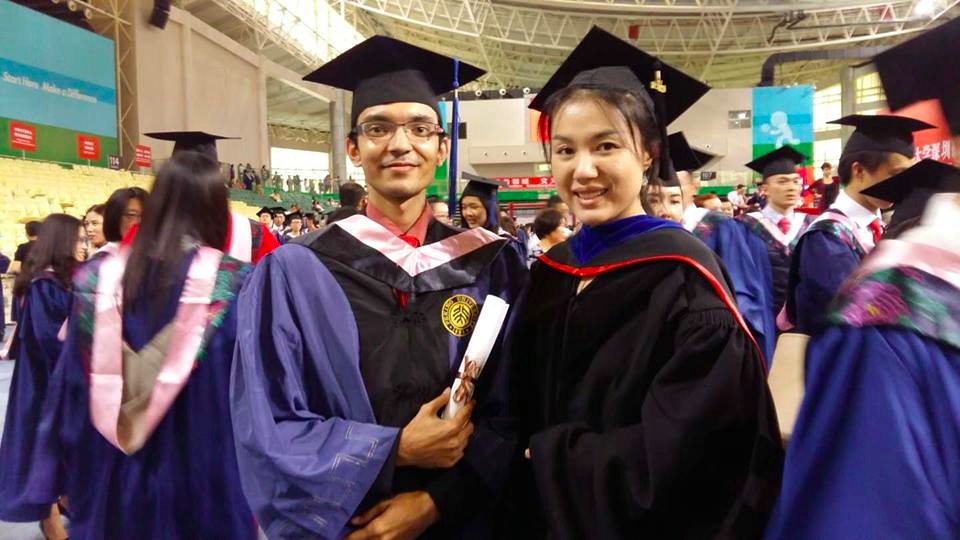I am supposed to pen down thoughts on why I want to stay in China. The answer is not glamorous. It is banal but candid, a small slice of a larger pie of my thoughts.
When I came to China for graduate school at Peking University, I did what I believe the first thing an expat does, compare. I realized that India and China, pegged as rival nations in every quarter, converge in more than one way. Both are densely populated, linguistically diverse nations with a complex socio-political fabric. Historically, owing to our geography we’ve exchanged a fair amount of culture, in addition to having traded for centuries - I am going to abstain from further indulging in cultural nostalgia. Next I did what I believe the second thing an expat does when comes to China - ponder over what do for the next three years to become financially well off.

Sunny on graduation day with Advisor, Jiao Shi
First, I found out that there exists a need for rearticulating the India-China relationship in a postmodern world. A massive information vacuum that exists between the two nations. The flow of information between them is fractured at best. And in my stay here, I seek to suture this cultural wound. I came to realize how the understanding of an average citizen in both nations, of what lies on the other side is plagued with cultural stereotypes and several misconstrued notions distributed all over the intelligence spectrum. Stereotypes are antithetical to the project of cooperation. This needs to be brought into popular discourse among the community of expats and citizens alike because the economic engagement of these evolving economies is inevitable in the future. It is not hard to foresee a need for professionals who’ve spent a considerable amount of time in India and China and understand the internally consistent logic or norms of both countries. After all, 2.5 billion people cannot remain willfully ignorant of each other forever. I see this as the optimal opportunity to put my skills to use and fashion a niche for myself to build a successful career.
Second, the people I met here exhibited a keen interest in learning about my culture and what misses the headlines. I invested copious amounts of time in learning Mandarin Chinese, in order to successfully understand the information stack I bypass everyday. Something wonderful happened along the way. I found companionship in a beautiful northern Chinese lady, Han Yu. PHBS will always remain the place where I found the love of my life, and as clichéd as it may sound, it remains to date, the strongest reason why I want to stay in China. It seems that she picked the lock of my mind and exposed me to the wonderful things love as a force can bring about. I may not (and may never will) understand Chinese culture to its deep core, but I thrive on morning walks with my partner. An episode of 天龙八部 and an evening cup of tea with her is the most attractive prospect of my day. If I get to do this every day for the rest of my life, my life can be a stuck, infinitely looped vinyl record for all I care. I wish for people to have precisely these experiences where cultural differences are erased in a flash and all that remains is deep mutual respect and admiration.
While studying at PHBS, I invested a significant amount of time in building camaraderie with a small group of friends and learning about China. Even if the reasons I described earlier were a figment of my imagination, I have a strong proclivity to persist and stay in China. Yes, three years in graduate school and I am knowingly falling for the sunk cost fallacy. Forgive me.
I will move from the prosaic to the pertinent. Where does PHBS come in all of this?
Very broadly speaking, PHBS taught me how to teach myself. This is the most important skill to have. It has helped me overcome the biggest challenge I have faced while working in Shenzhen - to remain relevant within the firm. But PHBS’s contribution goes beyond this. Chinese labor market is very rigid and labor regulations are fluid and ever changing. The irony is anything but subtle. Essentially, PHBS lent me a much-needed immunity from the ever-changing regulations.
If a Chinese firm wishes to hire a non-Chinese, it has to tender an explicit undertaking that 1) there is no Chinese applicant available to do the job; 2) the non-Chinese applicant deserve the salary they wish to pay him, and 3) the work he will be doing will be beneficial to China (picture the broadest interpretation of the term possible). And in a country where 上有政策,下有对策, these guidelines are implemented by the regional labor bureaus with enviable efficiency.
My experience has been that being a PHBS graduate made it convenient for firms to convince the labor department of my ‘qualifications’. I was issued an Alien Employment Permit without any work experience and automatically classified as a B category expat undue scrutiny because I am a PHBS graduate. If past is a window to the future, it will become progressively difficult for non-Chinese nationals to live and work in China. The regulatory bias has nothing but widened in the one year that I have been working in Shenzhen. I am certain the limited immunity a PHBS diploma provides will increasingly be more useful in the days to come.
As I recalled in the beginning, I was asked why I want to stay in China. The answer may change with the passage of time, but nothing will change the fact that these are indeed the basic tenets of my interest in staying in China long term.
Written by Sunny Mewati - Class of 2013, Finance









